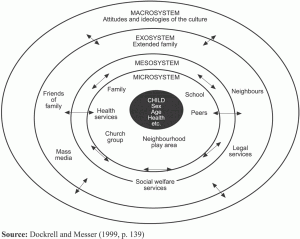Family, Facebook and the future of social networking
As I mentioned the other day, Facebook set the stage for a big announcement yesterday. What they have announced, a new version of Facebook Groups, has apparently been in the pipeline for some time. Although Zuckerberg is typically ebullient when he says that they have been ‘completely overhauled‘, it’s hard not to see this development as simply designing them as they should have been done in the first place. He says it’s about sharing, but it’s not: it’s about relationships. At the same time, it can be seen as pre-empting a threat from Google Me, as well as targeting many other social competitors.
At the core of this development is the recongition that adult human beings’ network of social relationships are rearely organised in a list-fashion as they are on Facebook at present: instead, most of us have groups and circles, partially overlapping, of family, friends, acquaintances and colleagues, each of whom we interact with differently. It is highly unlikely that any social networking system will survive commercially unless it recognises this.
From a psychological perspective, this is quite straightforward: when you look at human social development from an ecological standpoint, there are multiple levels interacting with each other – see the image above. Bronfenbrenner (1979, p. 3) describes our environment as like a series of Russian dolls, beginning with our most immediate environment, working out to our political, cultural and historical setting, each of which impacts on our development, not to mention the interactions between the systems. Hence, a social networking site should reflect this system in its design. Facebook, at present, doesn’t, and it remains to be seen whether or not this new Groups development will make any difference.In addition, why Facebook is moving in this way can become clearer when we take into account a few observations, some of which I’ve mentioned previously.
1. Facebook’s ‘radical transparency’ ethos does not suit the entirety of its users. In fact, as I’ve argued previously, that drive towards complete social openness only really suits students: the rest of us aren’t in college any more, or never have been.
2. Even a casual observation of the average Facebook user’s News Feed will reveal a large amount of ‘noise’: pointless messages, like when other people change their Profile Picture, or add more friends. A quick content analysis I carried out a while back of replies to a post on Facebook’s own Links Page revealed that less than a quarter of them were actually replies to the post – the rest were largely irrelevant.
3. In a similar vein, a recent survey (press release only as of yet) suggests that the most popular reason for ‘unfriending’ someone is frequent, unimportant posts.
So what does this boil down to? People are getting used to Facebook for proper communication – the novelty is wearing off, and we’d like to use it to simply keep in touch with people in a meaningful way. Let me explain…
I recently accepted a friend request from somone I never thought I’d hear from on Facebook – my mother (hello Mum!). Of course, the internet is laden with hyperbole, especially about itself, and how it’s going to change our lives, and social networking is one of the prime offenders in that regard. Connecting people and all that craic. But I think it’s a fair assumption that Mark Zuckerberg did not build ‘thefacebook’ in the hope that it’d help him stay in touch with his folks.Of course, there are all kinds of conflicting reports about this in the media. Various ‘studies’ are saying that ‘Facebook is a Generation Y show-off tool‘ and questioning how parents’ relationships with their children on the site while other experts are saying that Facebook can strengthen family ties. It’s this latter possibility that I reckon will be a major an unexpected use of social media in the future, as older adults increasingly take to logging on to Facebook
Now of course, these are not peer-reviewed research papers, but that’s besides the point. In fact, when you remove yourself from it conceptually for a second, and ask yourself what Facebook actually does, then the future of social networking becomes quite clear. Facebook simply allows users to connect and share with other people. When you think about it, if you have a computer, with an internet connection, well, what else would you want to use it for?Pictures of kittens or meaningful relationships?It’s such a very basic use of the technology that it’s remarkable that we haven’t had something like Facebook for a lot longer. In the future, our children will ask us what we did with computers before social networking came around. And we’ll struggle to answer.
Reference:
Bronfenbrenner, U. (1979). The ecology of human development: Experiments by nature and design. Cambridge, MA: Harvard University Press. The ecology of human.

